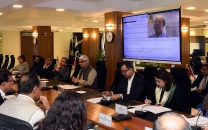Pakistan 'not prepared to detect and respond to health threats’: WHO report
World body highlights the shortcomings of the country’s health sector

World Health Organisation agrees to respond to emergencies more efficiently
PHOTO: REUTERS
WHO had alerted Pakistan of the shortcomings and their solutions in its mission report ‘Joint External Evaluation of IHR Core capacities of the Islamic Republic of Pakistan’ issued last year, but Pakistan is yet to fulfill its responsibilities.
“Like many UN members, Pakistan is a signatory to the International Health Regulations (IHR), but it is yet to meet the required core capacities despite multiple extensions – a situation that has the potential to jeopardise the country’s travel and trade,” said the report.
Pakistani candidate running for WHO top post eliminated
The aim of the report was to highlight the shortcomings of Pakistan’s health sector which could help the country in finalising its five-year roadmap to develop a strong public health system which follows IHR.
The report also calls for a critical need for continued and expanded multi-sectoral communication and coordination, sufficiently funded and widely supported for strengthening IHR capabilities.
It further calls for establishing a strong, visible, active surveillance and tiered public health laboratory system in order to develop and enhance regulations, standards and coordination mechanisms for food safety.
It added that there is a need for cross-sectoral approach for managing anti-microbial resistance and control of healthcare associated infections.
On World Health Day 2017, WHO urges you to talk about depression
Meanwhile, an official in the Ministry of National Health Services, Regulation and Coordination who spoke on condition of anonymity, said, “Pakistan has started work to overcome the gaps mentioned in the report, but it is still work in progress and is being carried out on a slow pace.”
The official said that the country had formulated a national action plan for addressing the gaps, adding that the provincial health departments were also in the process of formulating PC-1 for the implementation of the plan.
“It’s a fact that currently Pakistan lacks a mechanism for gathering data for diseases on a daily basis,” regretted the official. “Without having a national consolidated data it is impossible to formulate policies to address the gaps,” lamented the official.



















COMMENTS
Comments are moderated and generally will be posted if they are on-topic and not abusive.
For more information, please see our Comments FAQ